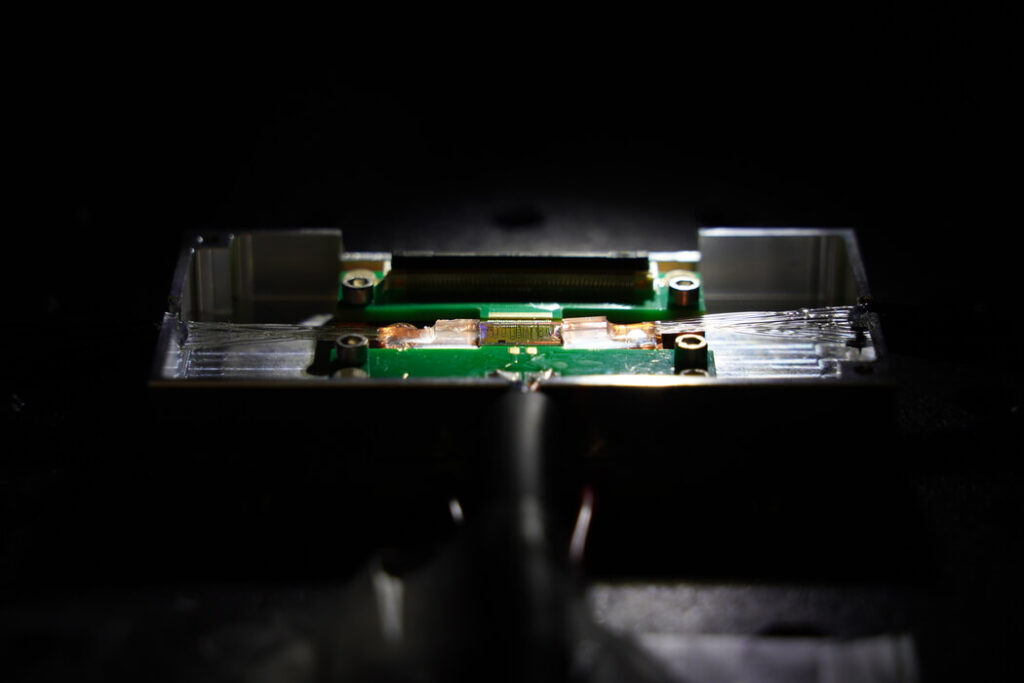Startup’s researchers generated error-resistant photonic qubits on a single chip for the first time.
Toronto-based Xanadu says it has edged closer to solving two of the hurdles plaguing the quantum industry: eliminating errors and scaling up.
This development is a step on Xanadu’s “hardware roadmap” towards its ultimate goal: building a quantum computing data centre in Canada by 2029.
The quantum startup announced that its researchers have created a quantum chip with error-resistant photonic quantum bits (qubits), or the basic units of quantum computing, for the very first time. The development forges a viable path toward a useful and scalable quantum computer, the company said.
A scientific paper describing the breakthrough was published in the science journal Nature on Wednesday, the fourth time the publication has featured Xanadu’s work.
Quantum computing companies are in a race to build machines that can solve useful problems. Xanadu has taken the photonic route, using light particles to power computations. In this experiment, researchers used a special type of qubits known as Gottesman-Kitaev-Preskill (GKP) states, which allow many photons to encode error-free information and perform operations at room temperature.
Unlike the binary bits in classical computing, qubits can exist in two states at once—zero and one—allowing for alternative, and in some cases accelerated, approaches to problem solving.
For Xanadu, this development is a step on its “hardware roadmap” towards its ultimate goal: building a quantum computing data centre in Canada by 2029.
“That’s where we’re headed,” Xanadu founder and CEO Christian Weedbrook told BetaKit. “Everything’s been driving to this moment.”
Weedbrook explained that a quantum data centre would, like a traditional data centre, house thousands of server racks containing the new chips Xanadu demonstrated today. The company unveiled its photonic quantum computer Aurora in January, which Weedbrook said “solved scalability” by networking server racks together. Aurora consists of four interconnected server racks containing 12 qubits, but Weedbrook said Xanadu’s metric for useful quantum computing is around 1 million physical qubits.
RELATED: Nord Quantique says error-correction discovery could make quantum computing data centres practical
“This demonstration is an important empirical milestone showing our recent successes in loss reduction and performance improvement across chip fabrication, component design, and detector efficiency,” Zachary Vernon, CTO of hardware at Xanadu, said in a statement.
The next step, Xanadu said, is to reduce optical loss in its quantum systems, where signal quality degrades as transmission distances increase with the optical fibres connecting quantum hardware.
“When you encode information in a laser, not all info makes it from start to finish,” Weedbrook said. “That’s what we’re fighting against.”
Xanadu previously unveiled the GKP state approach in a research article in the journal Physical Review Letters in March, which the company claimed could reduce the number of physical qubits needed for fault-tolerant quantum computing. The company said GKP qubits also reduce overhead costs because they allow for entanglement, when the states of two qubits are related across physical space.
Several startups are trying to reduce qubit error creation, including Canadian companies Vancouver-based Photonic and Sherbrooke, Que.-based Nord Quantique. The latter, which takes a “multimode” encoding approach, unveiled a new error-correction method last week that it says draws much less energy to solve encryption problems than photonic systems.
All three companies were recently selected to take part in a quantum race program backed by the United States Defense Advanced Research Projects Agency (DARPA). Xanadu inked a four-year research and development (R&D) agreement in May with the US Air Force Research Laboratory (AFRL).
The near-term feasibility of practical quantum computers is still the subject of intense debate among industry and researchers. Big tech companies such as Microsoft have had their breakthrough claims roundly scrutinized, and public companies in the game have seen markets react strongly to predictions about long timelines. Industry jargon terms such as “quantum supremacy” (outperforming classical computers in a given task) versus “quantum utility” (usefulness in real-world applications) contribute to the debate, as companies small and large compete to notch breakthroughs.
Founded in 2016, Xanadu became a tech unicorn in 2022 and has raised $275 million USD in funding to date. Last year, Weedbrook told The BetaKit Podcast that Xanadu was planning to raise $100 million to $200 million USD in late 2024 or early 2025, which Weedbrook said is still an ongoing process but “going well.”
Feature image courtesy Xanadu.

